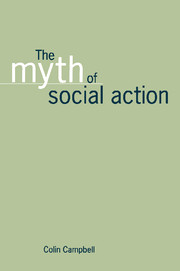Book contents
- Frontmatter
- Contents
- 1 Introduction
- 2 Action reported missing in action theory
- 3 Action and social action
- 4 Action versus social action
- 5 The rise of social situationalism
- 6 The argument by denial
- 7 Accounts and actions
- 8 The argument by exclusion
- 9 The argument through incorporation
- 10 The ‘learning everything from others’ thesis
- 11 The communicative act paradigm
- 12 The linguistic turn for the worse
- 13 The myth of social action
- 14 The obstacle which is social situationalism
- 15 Epilogue: bringing action back in
- Notes
- Bibliography
- Index
3 - Action and social action
Published online by Cambridge University Press: 07 May 2010
- Frontmatter
- Contents
- 1 Introduction
- 2 Action reported missing in action theory
- 3 Action and social action
- 4 Action versus social action
- 5 The rise of social situationalism
- 6 The argument by denial
- 7 Accounts and actions
- 8 The argument by exclusion
- 9 The argument through incorporation
- 10 The ‘learning everything from others’ thesis
- 11 The communicative act paradigm
- 12 The linguistic turn for the worse
- 13 The myth of social action
- 14 The obstacle which is social situationalism
- 15 Epilogue: bringing action back in
- Notes
- Bibliography
- Index
Summary
Over the past twenty to thirty years, there has been a marked change in terminological usage favoured by British sociologists. Increasingly, the term action has been displaced by the term social action.
In the 1960s and the early 1970s British sociologists tended to regard action rather than social action as the central concept. Thus John Rex in his Key Problems of Sociological Theory (published in 1961) refers to action as ‘the simplest theoretical term of all in sociology’, and does not accord ‘social action’ a separate entry in the index to the book but relegates it to the status of a sub-heading under ‘action’. Similarly, Percy S. Cohen in his Modern Social Theory (published in 1968), although discussing social action at length, also sees fit to list it as a sub-heading under ‘action’ in the index. Again, it is ‘Action’ and not ‘social action’ which is the featured entry in David Martin's 50 Key Words in Sociology (published in 1970) and, what is more, he proceeds to describe it as ‘the fundamental concept in the study of social relations and social interaction’. By the end of the 1970s, however, there had emerged a marked tendency to treat the two terms as if they were interchangeable, heralding the beginnings of a reversal of the former order of significance. Thus, both G. Duncan Mitchell (A New Dictionary of Sociology, 1979) and Panos D. Bardis (Dictionary of Quotations in Sociology, 1985) combine their entries for ‘Action’ and ‘Social Action’, whilst Burrell and Morgan refer to ‘social action theory or the action frame of reference’.
- Type
- Chapter
- Information
- The Myth of Social Action , pp. 23 - 28Publisher: Cambridge University PressPrint publication year: 1996



